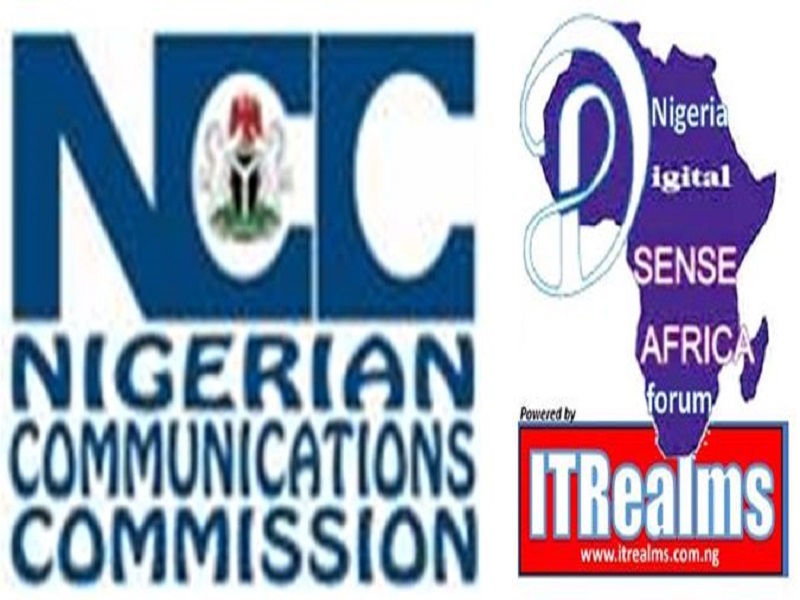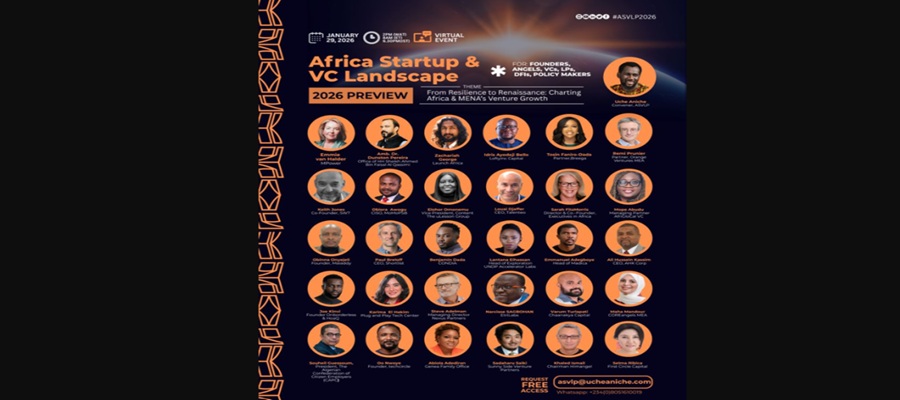Telecom
We’re Making Progress in Enthroning 5G for Digital Economy – NCC

Nigeria has made some significant success in the drive towards enthroning national digital economy for the country.

This was disclosed by Prof. Umar Garba Danbatta, Executive Vice Chairman and Chief Executive Officer (EVC/CEO) of the Nigerian Communications Commission (NCC), in his keynote address at the 2022 Nigeria DigitalSENSE Forum series on ‘5G: Enthroning Internet Governance for Digital Economy’ held at Welcome Centre Hotels, International Airport Road, Lagos and powered by DigitalSENSE Africa, a project of ITREALMS Media group at the weekend.
Nigeria DigitalSENSE Forum on Internet Governance for Development is put together by DigitalSENSE Africa, a project of ITREALMS Media group; made up of internationally reputed and award-winning Information and Communication Technology (ICT) industry analysts and perception managers; professionally affiliated to African Regional At-Large Organisation (AFRALO) for shaping the future of the Internet. DigitalSENSE Africa is a certified At-Large Structure (ALS) of the Internet Corporation for Assigned Names and Numbers (ICANN).
Buttressing his position, EVC who was represented by a Deputy Director and Head of Spectrum Database Management at NCC, Engr. Abraham Oshadami, while dwelling specifically on “5G: Enthronement in Nigeria’s Telecom Sector” outlined some 11-points to drive home his assertion.
Some of these steps, he said include the creation of a full-fledged department of Digital Economy in NCC with a mandate amongst others to ensure that the programs and targets set in the NNBP 2020-2025 and NDEPS 2020 – 2030 are rigorously pursued, tracked, and attained; INFRACO Companies have been licensed to deploy fibre on an Open Access Basis in Six Geopolitical Zones of the country and Lagos State. Approval to commence rollout was given in April, 2021.
According to him, they have developed and secured the Federal Executive Council approval on Nigerian 5G Policy to guide deployments of 5G services nationwide, while acknowledging efforts of the Honourable Minister of Communication & Digital Economy, Prof. Isa Ali Ibrahim Pantami.
In addition, he said, NCC has successfully licensed 2 lots of 100 MHz bandwidth in the 3.5 GHz Spectrum band for 5G deployment in December 2021, just as they set up and expanded the Internet Exchange Point capacity of 930 MB/s for Abuja to Lagos Route, 620 MB/s for Abuja to Kano Route, 310 MB/s for Lagos to Port Harcourt route, bolstering landed total offshore broadband capacity of 50.74 TB comprising 40TB Submarine and 10.74 TB of Satellite and the figures are already set for increase.
Equally, he said, followed up on the global industry trends on the 5G Spectrums such as the 26 GHz, 38 GHz and 42 GHz bands harmonized in World Radio Conference 2019 (WRC-19), NCC has updated the National Frequency Allocation Table (NFAT) to reflect the outcome of the WRC-19 through opening up the 60 GHz V-band; Opened up the 70/80GHz E-band for both point-to-point and point-to-multi-points deployments; and developed and published the Spectrum Trading Guidelines amongst other benefits.
These, he said, are evident in the efforts of the commission being demonstrated in the smooth update of previous technologies such as 2G, 3G and the 4G; and the one that is now being implemented to ensure the deployment and adoption of 5G infrastructure and services in Nigeria.
Equally speaking, the Director-General (DG), National Broadcasting Commission (NBC), Mallam Balarabe Musa said that in the past few days, digital technology usage around the world have improved including raising the bar on credibility of election results across the continent.
Mallam Balarabe, who was represented by a delegation led by the Lagos Zonal Director, Dr. Chibuike Ogwumike, charged stakeholders including various regulatory organs, industries, network operators, service-technology providers, public and private partnership organisations to synergise and be in continued dialogue to address the challenges that may face the widespread 5G deployment worldwide.
Other activities at the twin-event was the unveiling of a book authored by the multi-award winning journalist and Group Executive Editor, Remmy Nweke which was reviewed by Chairman, Association of Licensed Telecom Operators of Nigeria (ALTON) Engr. Gbenga Adebayo and President, African Health Journalists Association & Principal Consultant/CEO InterPares Media Limited Dr. Declan Okpalaeke, whereas the Chief Unveiler was the Chief Executive Officer, Amano Investments West Africa and President, Mandilas International Trade Centre, Chief Anthony Amechi Okeke.
Earlier In his welcome address, Lead Consulting Strategist, DigitalSENSE Africa/Group Executive Editor ITREALMS Media Group/Author-Sagacity of a digital revolution, Remmy Nweke said the book is based on well-researched analytics on several subjects such as diversification of Nigeria economy, role of ICTs in curtailing child malnutrition among others.
The event was chaired by the President/CEO Medallion Data Centre Ltd who doubles as President, Association of Telecoms Companies of Nigeria (ATCON) Engr. Ikechukwu Nnamani, who was represented by Mr. Olatunji Sulaimon, the Permanent Secretary; Ministry of Police Affairs Temitope Fashedemi was also represented by Mr. Adegbola Toluwalope, Nigeria Union of Journalist (NUJ) Lagos, Mr. Adeleye Ajayi as well as a President, Association of Anambra State Development Unions (AASDU Lagos), Chief Sir Amechi Ebeledike, Catholic Women Organisation (CWO) St. Jude Parish second vice president, Mrs Charity Akobundu, the CMO counterpart led by Secretary Kingsley Agba, chairman, Awba-Ofemili Development Union Lagos, Mr. Norbet Nweke, Chief Benard Chidebe, Chief Theo Okoye of Coswekkers Motors, CEO Tokas Motors, Prince Toike Obidigwe, Mr. Stanley Afunuro, Vice Chairman, ADU Lagos, Mr. Osita Anidebe, Mr. Cele N. Dom, Mr. Onyeka Victor Nweke, Doyen of St. Jude, Mazi Udo Chijioke, President, Nigeria Internet Registration Association (NIRA) was represented by a team led by Segun Akinwunmi among others.
Other dignitaries include a delegation from the Guild of Corporate Online Publishers (GOCOP) Maureen Chigbo, and the Secretary, Mr. Collins Edumaruse, former Managing Director, Champion Newspapers, Mr. Ugo Onuoha, Chief Chris Uwaje, the Oracle; Executive of Nigeria Guild of Editor, Gabriel Akinedewo and publisher of Freedom Online, delegate from Nigeria Information Technology Reporters Association (NITRA) led by Messrs Chike Onwuegbuchi and Chidiebere Nwankwo as secretary.
Telecom
ASVLP 2026: Africa, MENA VCs Gear Up as Tech Funding Hits $4.1bn Rebound

As Africa and MENA’s startup ecosystems transition from post-correction resilience into a new phase of disciplined growth, the Africa Startup & VC Landscape Preview (ASVLP 2026) will convene leading founders, investors, policymakers, and ecosystem builders on January 29, 2026, for its second annual, agenda-setting virtual forum.

Following a challenging global venture cycle, 2025 marked a notable rebound across the African ecosystem, with startups raising an estimated $3.2–$3.3 billion over the full year.
The recovery was accompanied by significant structural shifts: Kenya emerged as the leading destination among Africa’s “Big Four” markets for the first time, while Nigeria recorded a year-on-year funding decline, reflecting changing investor preferences, macroeconomic pressures, and a broader recalibration toward capital efficiency and sustainability.
Sectorally, fintech remained the most funded vertical, while climate & energy, AI-enabled solutions, healthtech, and infrastructure-adjacent businesses gained increasing attention. Across Africa and MENA, development finance institutions (DFIs) and family offices played a more pronounced role in anchoring funds, deploying catalytic capital, and supporting blended-finance structures, reshaping how early-stage and growth capital is mobilized.
ASVLP 2026 is designed to translate these data points into forward-looking strategy.
The forum will bring together venture capitalists, angel investors, LPs, DFIs, family offices, founders, corporate leaders, and regulators from Africa, MENA, Europe, and North America to assess 2025 outcomes and chart priorities for 2026.
The program will feature keynotes, fireside chats, panels, and deep-dive roundtables, including discussions on:
· The 2026 Africa & MENA FinTech Landscape, focusing on security, profitability, regulation, and growth frontiers
· Emerging Fund Managers, capital formation, and LP alignment
· Talent, operator depth, and institutional capacity as constraints to scale
· Regulatory evolution and cross-border market integration
A major highlight of ASVLP 2026 will be the Final DealRoom Pitch Session, where a curated group of high-potential startups will present to an experienced panel of investors.
• Founders can apply to pitch via: bit.ly/ASVLP-DR-Founders
• Investors seeking DealRoom access can request entry via: bit.ly/ASVLP-DR-Investors
Confirmed speakers for ASVLP 2026 include Khaled Ismail (HIMangel), Idris Ayodeji Bello (LoftyInc Capital), Zachariah George (Launch Africa), Tosin Faniro-Dada (Breega), Selma Ribica (FirstCircle Capital), Maha Mandour (COREangels MEA), Joe Kinvi (Borderless), Remi Prunier (Orange Ventures MEA), Karima El Hakim (Plug and Play Tech Center), Souheil Guessoum (President, The Confederation of Citizen Employers – Algeria (CAPC)), Remi Prunier (Partner, Orange Ventures, MEA), Maha Mandour (COREAngels MEA), Ali Hussein (President, Kenyan FinTech Association), Patrick Okebu (CIO, Interswitch Group) among other leading voices shaping capital, policy, and innovation across the region.
“The conversation has shifted,” said Uche Aniche, Convener of ASVLP. “It’s no longer about whether capital will return to Africa and MENA, but what kind of capital, deployed with what discipline, and in service of which long-term outcomes. ASVLP exists to help the ecosystem make sense of that transition.”
Participation in ASVLP 2026 is free but strictly by invitation.
Interested participants are encouraged to repost the official announcement on LinkedIn and comment #ASVLP2026 to receive a private registration link. They could also email [email protected] and request invite.
Telecom
TikTok, Instagram Blamed in US Youth Suicide Lawsuit

Major social media giants Meta Platforms, TikTok and Alphabet’s YouTube will face a landmark jury trial this week in Los Angeles County Superior Court over allegations that their addictive designs have fuelled a youth mental health crisis, marking the first such case to reach this stage.

Social Media
The pivotal personal injury lawsuit centres on a 19-year-old Californian woman identified as K.G.M., who claims her childhood immersion in Instagram, Facebook, YouTube and TikTok—engineered with endless scrolls, autoplay videos, notifications and algorithms—sparked severe anxiety, depression and suicidal thoughts.
Dozens of similar suits have surged since 2022 from families, schools and states, accusing the firms of burying internal research on teen harms while prioritising ad revenue through youth-targeted engagement hooks, despite Section 230 protections for user content.
Plaintiffs seek damages and design overhauls, arguing platforms bypassed parents and preyed on vulnerable kids; defendants counter there’s no clinical “social media addiction” diagnosis, no proven causation—kids with issues often use less—and they’ve added safeguards like parental controls and time limits.
Echoing Australia’s under-16 bans, the trial will scrutinise thousands of internal documents, expert testimonies and K.G.M.’s story, potentially expanding tech liability amid debates where studies show complex links, not direct causation, between screen time and disorders like eating issues or self-harm.
A win could mandate warning labels, age gates or algorithm tweaks, reshaping global platforms as U.S. Surgeon General advisories and global scrutiny intensify pressure on Big Tech to prioritise child safety over profits.
Telecom
Meta Tests Paid Subscriptions Across Instagram, Facebook, WhatsApp

Meta is gearing up to trial paid subscription services on Instagram, Facebook, and WhatsApp, aiming to diversify revenue streams beyond advertising while maintaining free core access for all users.

Meta
The subscriptions will offer enhanced tools tailored for everyday users, creators, and businesses, including advanced content creation, sharing, and workflow features distinct from the existing Meta Verified verification program. Unlike a uniform rollout, Meta plans varied testing formats per app to match diverse audiences, experimenting with feature bundles based on user feedback to refine the model.
A key element involves integrating Manus, the autonomous agent firm Meta acquired for $2 billion in December, into these apps alongside its enterprise sales. Manus enables complex task automation with minimal input, with early signs like Instagram shortcuts already spotted by reverse engineer Alessandro Paluzzi.
Video tools feature prominently: Meta’s Vibes short-form video generator in the Meta AI app shifts to freemium, where paid tiers unlock higher monthly creation limits beyond the free baseline. On Instagram, subscriptions could enable unlimited audience lists, non-follower tracking, and anonymous Story views, though specifics for Facebook and WhatsApp remain under wraps.
Drawing from Meta Verified’s 2023 launch—which provides badges, support, and protection mainly for creators—these broader plans target wider appeal amid industry shifts. Ad growth slows against TikTok competition, while Snapchat+ boasts 16 million subscribers at $3.99 monthly, proving demand for value-driven paid perks despite subscription fatigue risks from streaming and storage fees.
Meta will phase tests gradually, prioritizing feedback to shape long-term viability without alienating free users.

 News3 days ago
News3 days agoLIRS to Invoke NTAA to Recover Unpaid Taxes from Bank Accounts, Others

 News3 days ago
News3 days agoAnambra Cuts Monday Pay to Kill Sit-at-Home

 E-Financial3 days ago
E-Financial3 days agoNIBSS, Others Flag 13,417 Nigerian Fraudsters on Person of Interest Portal

 E-Financial3 days ago
E-Financial3 days agoFirst Asset Management Receives Upgraded Ratings from Agusto &Co and DataPro

 E-Financial3 days ago
E-Financial3 days agoCBN Prepares Fresh Debit Card Rules to Improve ATM Services

 General News3 days ago
General News3 days agoNigeria Treats Religious Violence as Attack on State – NSA Ribadu

 E-Financial2 days ago
E-Financial2 days agoCBN Upgrades Licences of Opay, Moniepoint, Kuda, Palmpay, Paga to National Status
- E-Financial2 days ago
Nigeria’s 9 Top FinTech Firms Valued at $10.6Bn in January 2026

























